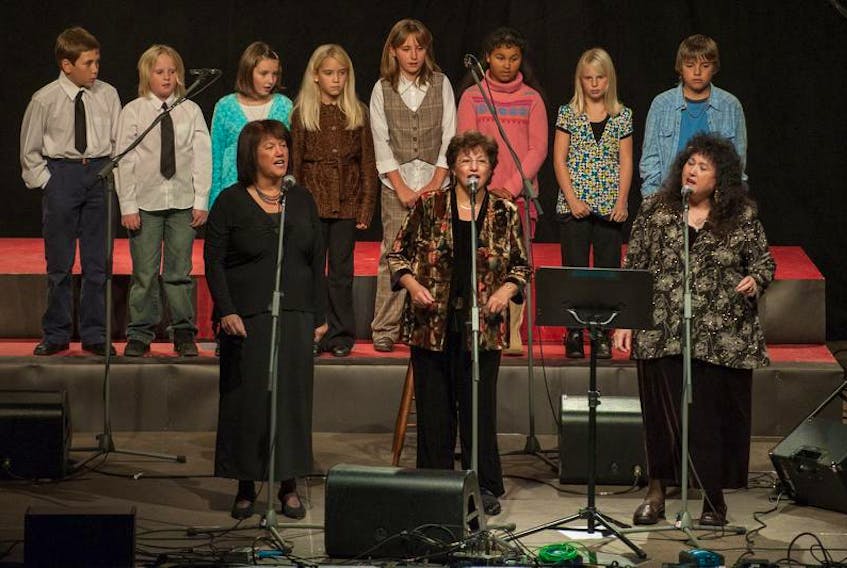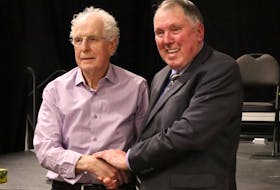Memories of their father won’t be far from the minds of three Ruddick sisters when they lend their voices to a memorial hymn sing Tuesday to mark the 60th anniversary of the 1958 Springhill mine disaster.
Daughters Valerie, Leah and Sylvia will sing a song based on a poem their father wrote just days after being rescued from No. 2 colliery after a devastating underground upheaval — similar to an earthquake — that claimed the lives of 75 of his fellow workers.
Maurice Ruddick’s poem later became a song that drew national and international attention to him and the hard-luck Cumberland County town.
On her Disaster Songs in Canada webpage, Cape Breton University ethnomusicologist Heather Sparling noted that while watching news coverage of the disaster, American bluegrass singer Bill Clifton was personally touched by a remark Ruddick had made to his rescuers.
The singer made a quick phone call to Ruddick, who was still recovering in hospital, asking if the miner would write to him about his ordeal. Clifton received a poem from Ruddick instead.
Clifton and a few musician friends created a six-verse ballad called The Springhill Mine Disaster that maintained the poem’s central theme as well as Ruddick’s first comment to rescuers: “Give me some water and I’ll sing you a song.”
The tune was immediately released in the United States and Canada and it received extensive play on local radio stations. Sparling noted Ruddick was listed as a co-author of the song and donated a share of his royalties to the families of those who died in the disaster.
Over the years, about a dozen other songs have been written about the tragedy. The most popular, a tune called The Ballad of Springhill, was penned by Peggy Seeger, a sister of famed American folk singer Pete Seeger.
Peggy’s song received more air play because she and her future husband Ewan MacColl, who helped write the tune, were established international performers, according to Sparling’s website.
The Ruddick sisters will be among a number of other local area singers and musicians performing at the hymn sing that gets underway at 7 p.m. in Springhill’s St. Andrew’s-Wesley United Church. They include event organizer Clare Canning, Andrew Lloyd, Marg Fisher, Gerald Davis, church organist Jim Scopie and an ecumenical choir.
“As children, it was just something we knew about him,” daughter Valerie said of her father in a telephone interview from her Riverview, N.B., home. “He always sang and played the guitar. He wrote music and songs. It was just a natural thing for him.
“I guess he instilled that into the rest of the family,” she said of her mother and 12 brothers and sisters.
After the disaster, Valerie said her father started training her and sisters, Sylvia and Ellen, to sing harmonies and take leads while he played a four-string guitar, sometimes using his vocal cords to simulate the sound of an upright bass.
She said they became The Singing Miner and the Minerettes and performed at service clubs, schools, churches and festivals throughout the Maritimes
“We sang a lot of old . . . spirituals and hit parade songs by Johnny Cash and the Beatles. The spirituals were the big ones, some of which my father wrote.”
Still pre-teens, the girls were later taken under the wing of freelance journalist Frank Fillmore who, impressed with their singing, wanted to advance their careers in the Halifax-Dartmouth area.
Valerie said Fillmore changed their names to Reddick from Ruddick, so they became The Reddick Trio before they performed at local coffeehouses and did shows with Gordon Lightfoot, John Allan Cameron, Robbie MacNeil and other well-known Canadian performers.
She said they taught Anne Murray gospel music while serving as backup during some of her early Springhill concerts. The group also made a CD of their father’s song for the History Channel.
But with the new disco sound, music changed and coffeehouses started dying out, she said. The group broke up in 1966.
In the early 1970s, Valerie said, their father started another group, called The Harmony Babes, with her younger sisters Leah, Iris, Maureen, Kareena and brother Jessie. All in their pre-teens, they performed for a couple of years at Maritime venues before disbanding and moving on with their lives.
Six decades after the disaster, Maurice Ruddick’s great-granddaughter, Salima MacDonald of Riverview, N.B., wrote a song in his memory as part of a high school class project. With guitar in hand, the budding musician sang Two Miles Down in front of her classmates.
“I never actually got the chance to meet my great-grandfather, but I’m sure he was a wonderful man,” Salima told a CBC interviewer last year. Maurice Ruddick, whose hymn singing is credited with lifting the spirits of his fellow trapped miners, died in 1988.
Canning said the hymn sing will include a moment of silence to mark the exact time of the 8:06 p.m. disaster, followed by a reading of the names of those lost.
Harold Brine, the last surviving trapped miner, is expected to attend the service to honour not only the mine victims but also their grieving widows and the children left behind.
Related:
- Did Springhill miners see the bump coming? A look at the science behind the 1958 mining disaster
- A town that rises from overwhelming adversity: Springhill changed forever following 1958 mine disaster
- Last man out of Springhill mine after 1958 bump dies
- VIDEO: Last survivor remembers the Springhill bump
- DeMONT: Bringing the Bump to the world









